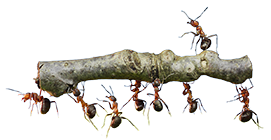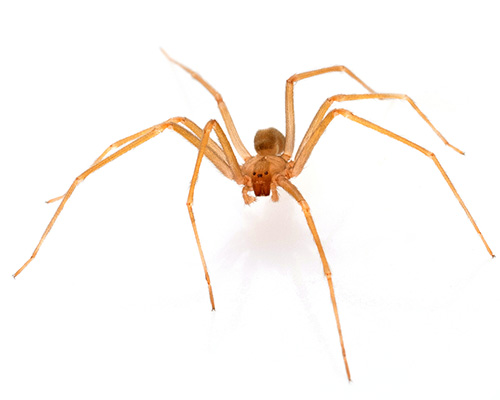
Eugene Spider Control
There is no doubt about it! Spiders (arachnids) can be scary, intimidating, and flat out creepy. If you are like me, you do not want spiders in your house, and least of all in your bedroom.
Everyone is familiar with spiders, and for the most part disliked, no, actually, most of us hate spiders. However, their reputation is somewhat undeserved. Not all spiders are out to get you and ruin your day.
First there are many kinds of spiders out there, more than 46,000 species of spiders have been identified and catalogued. Among these only a very few are poisonous to humans. Most of them provide some benefit to maintaining a balance in insect environment. For one, they even eat cockroaches! Now this is a big plus for them, and it is a good service they provide.
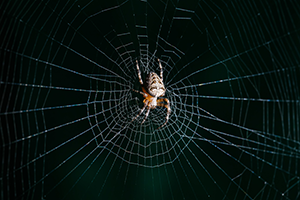
Some people have an abnormal fear of spiders, that fear is called arachnophobia. This is because they have an incomplete understanding of what spiders are and what they actually do. Some are to be feared, or at least avoided, while others present no threat to humans.
Spiders are an insect that have eight legs and two body parts; they also have multiple pairs of eyes. In many cases, their eyesight is very poor, although there are some species of spiders that have exceptional vision, which aids in their survival. Spiders probably live longer than you might expect. The average arachnid life span is generally between 1 and 2 years, unless they meet up with you and shoe in hand then their life span abruptly ends with a thud! There are species of spiders that can live more than 20 years in captivity.
Spider webs are made of spun silk like material, and all spiders produce silk. This silk is far superior in strength, elasticity and lightness to manmade synthetics. Case in point: The Black Widow spider silk is 10x stronger than steel. Since it is so strong and not affected by changes in temperature and humidity, and are used in the manufacture of the cross hairs of gun sights.
Spiders are not passive, they are predators and they feed on other living insects. Since they do not have chewing mouthparts, they inject their venom, which is a digestive enzyme, through their hollow fangs (chelicerae). The venom is powerful and immobilizes its prey so the digestion process can begin. The spiders then feed on their prey by sucking the digested liquid. Yumm!
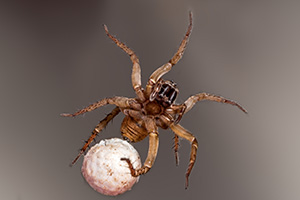
All female spiders make a silk enclosure, cocoon, for their eggs. In this state, the eggs are protected from many elements including chemicals. It is interesting to note: there are no chemicals that will penetrate the cocoon and kill the eggs. It is only after they hatch that they become highly susceptible to chemical treatments. The new hatchlings are extremely sensitive to chemicals, much more so than the adults, therefore they are easier to control.
There are hundreds of eggs in each cocoon maturing and just waiting to hatch. Once the eggs hatch, they can, among other things, float on the air currents. As these currents move under the eaves of your house, the new hatchlings will attach themselves and set up housekeeping. In a short time, you have spider webs everywhere.
It is truly amazing; Airline pilots have observed spiders floating on the air currents at altitudes exceeding 30,000 feet. This is why if you live near a busy street or on a hill where the air currents swirl under the eaves you will find the perfect nesting spot for spiders. Once they attach themselves, they immediately set up housekeeping and start spinning webs. If this is where your house is located then unfortunately you will discover that you can clean up the spider problem, and then the next day be faced with the same problem. The new eggs hatch and once again, the hatchlings following the air currents and are blown under the eaves.
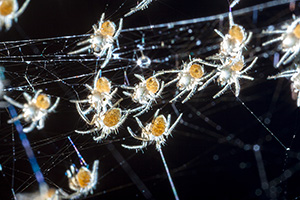
Some few species of spiders exhibit a type of social structure. They will often build a common web that can support up to 50,000 spiders. Additionally they can cooperate with their skills in hunting a food source. Now that would make a good Sci-Fi movie, packs of hunting spiders working together…scary!
Spidersare very sensitive and react to changes in temperature and humidity. As it turns colder outside, when the temperature drops to below 42 degrees, they begin to look for a warmer environment. At this temperature, the wax on their outer skeletal shell becomes stiff and makes it difficult or even impossible for them to move. That is when they search for their winter home, a nice resort where the temperature are more comfortable.
It is inside your house that they find refuge on the coldest wintery days for it is springtime and a most desirable place for them to live. They do appreciate you keeping your home warm in the winter. During the summer, just like us, they prefer the outside.
Temperature is not the only reason you will find them inside. If the source of their food drops off, or it dries out and there is little water available it will drive a spider inside. They are also brought into the house on plants or on firewood and other items that are stored in attics, basements or the garage.
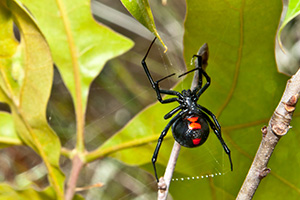
Yes, in the Eugene area we do have Black Widow spiders. While they are not the problem you find in California or Arizona they still are a cause for caution. Their bites are not only painful but can do serious damage to your body if not properly and immediately treated. A Black Widow (LatrodectusTheridiidae) bite is very rarely fatal, they are however very painful. Muscle cramps flat out hurt! Can you imagine all your mussels cramping at the same time? That is a Black Widow bite! These spiders while protecting their eggs can jump 4 feet out from an upper area to a low area. Don’t mess with their eggs!
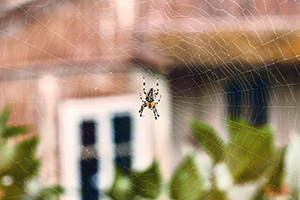
Now comes your part, this is what you can do to reduce your problem with spiders.
The first step, which is very important, is to clean your house on a regular basis. Remove all bags, paper and other items that provide harborage areas to reduce the potential harborage areas for not only spiders but other insects as well. By reducing, the insect population you will at the same time be eliminating a necessary food source for spiders. Less food, fewer spiders you will have to deal with.
Next comes removing the webbing and egg sacks with a broom. This should be done both inside and outside of your house. Be sure to destroy the egg sack, or the spiders will hatch.
In addition, outside be sure to remove firewood piled against or near the house. Next, keep the grass mowed and the areas near your house weed free. Be sure to trim all shrubs, bushes and trees so they are not touching your house. Once or twice per season, hose the outside of your house to remove any webs and egg sacks. Make sure all screens or doors, windows and outside ventilation areas are free of holes and tears. Replace damaged screens.
You will find that most insects are attracted to white light. Switching to yellow bug lights outside will reduce the number of insects. Be sure to seal any cracks around windows and doors, especially around basement windows. Spiders will use these are areas spiders can use to gain access to the inside of your home.
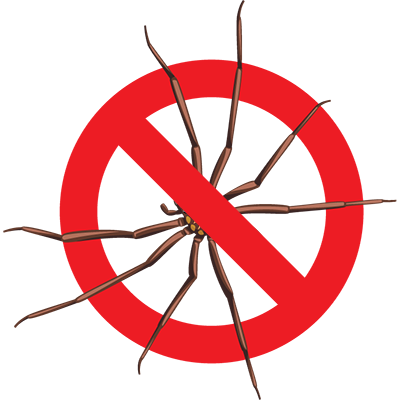
In the end, the most effective way to control spiders is with the use of chemicals that are designed specifically for them. Using the wrong material will repel spiders to other parts of the house where control can be difficult. Using the wrong chemical, especially those with a strong odor can alert spiders to the danger they are about to encounter. If a spider senses a chemical barrier, they can shut off the respiratory system and tip toe through the material until safely past the threat. In addition, many chemicals for spider control can be very problematic when used inside your home. If not properly applied they can cause some uncomfortable irritations.
I have the right materials, the right technology and the right equipment to safely and effectively control your spider problem. Moreover, I will take control of your spider problem while protecting you, your family, your pets and our environment. For results you will see tomorrow, call Merle’s Pest Control today.
Eugene Spider Control
For the best and safest results, call Thad, at Merle’s Pest Control (541.514.3027).
Pest Navigator:
If you have seen any of these lately call me, Thad, and I will help you safely regain control over your home environment.

